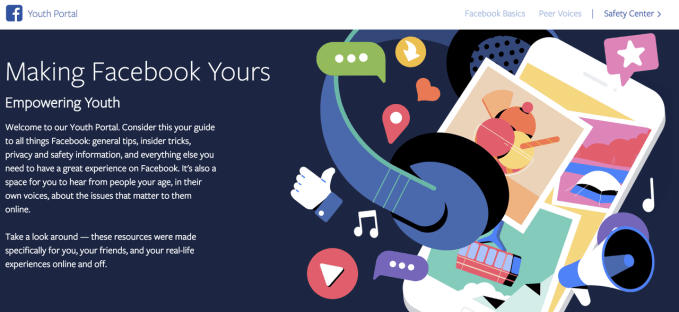There’s probably an important gap in attention being paid at internet companies to young kids that are good targets for parental controls and older ones who are having to learn to use the internet in a responsible way on their own.
Today, Facebook is releasing a new Youth Portal that offers some guidance to teens on how to navigate the service, how to stay secure, while also helping them understand how their data is used. Facebook says that that they began showing tips for teens in the newsfeed earlier this month related to some of these topics.

While many of the sections in the portal are devoted to basic topics like how to unfriend or block someone, a bit of the information is structured in more of a journalistic format focused on helping Gen Z users start their internet usage off on the right foot in a way that older generations haven’t.
In a “Guiding Principles” section, the tips are structured after oft-quoted real world advice:
Think (for 5 seconds) before you speak
Before you post publicly, pause and ask yourself, “Would I feel comfortable reading this out loud to my parents and grandparents?” There will always be people at your school who are social media oversharers (and adults in your life who are, too). Resist the urge, ignore their noise and save the juicy details for your close friends only.
One of the more useful things it does is organize information related to Facebook’s data policy in a more accessible way that admittedly may not answer every single question but also doesn’t overwhelm young users who may just be looking for the basics. It generally aims to address stuff like what data Facebook collects and how they use that information.

At the end of the day, it’s just an information page. The Youth Portal won’t directly curb how Facebook approach cyber-bullying or abuse, but the hub does organize a lot of information that pops up on the site while you’re using it into a single place where someone can just blaze through it in a single go.
More importantly it’s just a nice resource for Facebook to refer younger users to when there’s an issue that’s more likely to get looked at then the Terms of Service-style help pages that generally hold this information.
The Youth Portal goes live today in 60 languages.
 info@businessghana.com
info@businessghana.com


















